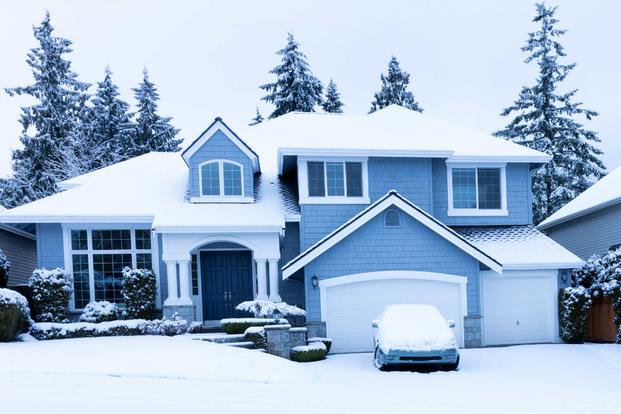Post from MilitaryByOwner
It's not often that military homebuyers have the opportunity to purchase a house at the prescribed perfect time according to the best real estate buying practices.
We all know that when it's time to PCS, it's time to PCS, regardless of the season.
So, it's not uncommon for a service member to buy a house during the cold months while managing negative associations, such as timeline and weather inconvenience, reduced inventory, and challenging home inspections.
However, there are nationwide home-buying trends (abnormally decreased inventory and sky-high prices) that have stuck around for the last several years that make purchasing in any month significantly more difficult and leave buyers open to home shopping all year round. Add in the proliferation of the online real estate marketplaces, and buyers are even more prone to buy a house in traditionally off-season months.
Timing is of the essence if the right property comes along during the winter. You'll have to act fast and hire a professional home inspector to add a level of security and confidence before signing the closing documents.
Here's what you need to know about a wintertime home inspection:
The Positive Aspects of a Winter Home Inspection
Each season brings weather phenomena that impact how a house performs. Winter months are hard on wear and tear of the structure, and trained inspectors know exactly where to look to see how the house is responding. Winter temperatures provide the opportunity to look for:
- Cracked and frozen pipes, which lead to larger water problems post-melt.
- Drafty doors and windows. They are energy inefficient and drive up heating costs.
- Condensation on windows. In cold temperatures, condensation could be an indication of a ventilation problem. The windows also may have inefficiencies or defects.
- Inadequate insulation, especially in the attic. The lack increases home heating bills.
- Clear spots on the roof from snowmelt. Spotting is a visual indicator of excessive heat escape.
- Ice dams and icicles. These indicate problems with the gutter system or the roof.
- The integrity of the framework. Deficiencies under added pressure from snowpacks begin to appear.
- The overall health of the heating system. It is easier in the winter to distinguish whether there is an imbalance of heat distribution.
- Inspecting the HVAC system. Carbon monoxide leaks and a possible need for a HVAC system cleaning could also be indicated.
The Negative Aspects of a Winter Home Inspection
It's always the right idea to perform a home inspection before a purchase, but a winter inspection poses a few challenges. Buyers will need to consider some of the restrictions and prepare to have multiple inspections done if the weather doesn't cooperate. Most inspection companies build these contingencies into their payment and visitation schedule.
- The A/C unit should not be run under 65 degrees to avoid damage, but a physical inspection is possible.
- Active leaks and poor drainage are difficult to detect if the water is frozen.
- An entire assessment of the condition of the roof is impossible if covered with snow.
- Outdoor features such as the driveway, landscaping, patios, decks and irrigation systems are difficult to inspect under the snow.
- Scheduling may be difficult due to shortened daylight hours and weather.
- A professional arborist may need to be called in to discern between dead or dormant tree limbs.
Tips for Finding a Home Inspector and What a Standard Inspection Includes
Your real estate agent likely has a couple of names of trusted inspectors they prefer to work with, but it's also helpful to ask for recommendations from neighbors and friends in your area. If you'd like to research names on your own, head to the American Society of Home Inspectors. Not every state requires the same licensing, certifications or levels of expertise.
A winter home purchase should not exclude a thorough home inspection. In fact, a VA loan requires an appraisal. An appraisal is not as detailed as an inspection, but it does verify basic safety and health standards.
Routine and key features are addressed during a standard home inspection regardless of season, so the importance of an inspection of your future home purchase remains. These are the major checkpoints:
- Visible plumbing systems
- Visible electrical systems
- Kitchen appliances
- Heating, ventilating and air conditioning (HVAC)
- Doors and windows
- Attic insulation
- Visible foundation and basement
- Exterior elements such as siding, decks, and lighting
You'll likely have to call in a specialized inspector or industry professional to compile a report on home amenities such as a structural concern, pool, septic system, or fireplace and chimney.
Sure, the number of homes sold between December and February falls short of the traditional spring market, but military families don't always have the luxury of waiting for larger inventory during the spring and summer. Take advantage of the options a winter home buying market offers and secure your investment with a proper home inspection.
Get the Latest Financial Tips
Whether you're trying to balance your budget, build up your credit, select a good life insurance program or are gearing up for a home purchase, Military.com has you covered. Subscribe to Military.com and get the latest military benefit updates and tips delivered straight to your inbox.




